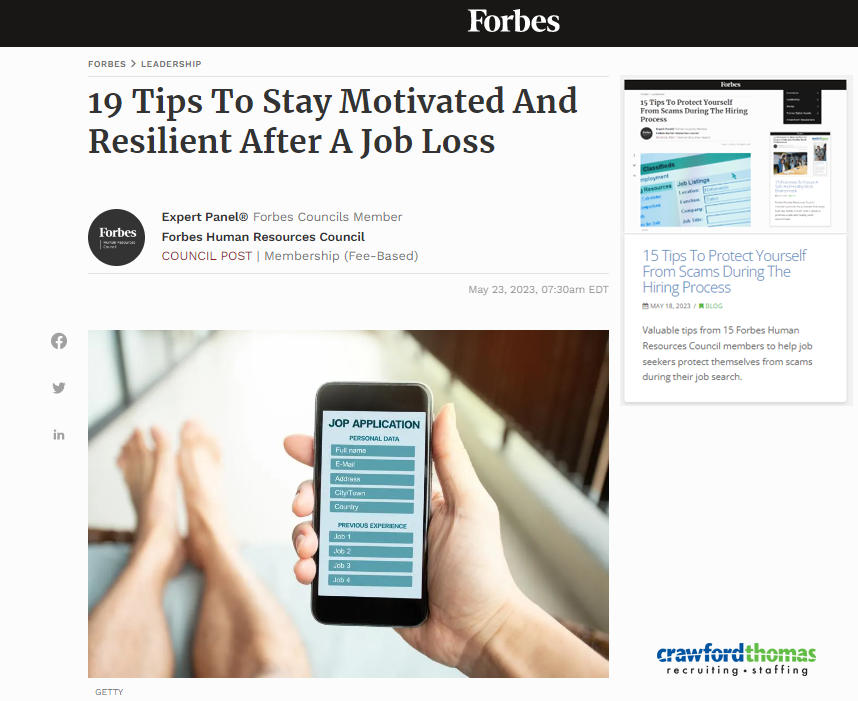Job loss is an unfortunate reality that many people encounter at some point in their career journey. Especially during tough economic times, the fear of unemployment can be overwhelming, leading professionals to panic and lose sight of their short- and long-term goals. However, it is crucial to remember that resilience and determination can pave the way to success, even in challenging circumstances.
Below, 19 members from Forbes Human Resources Council offer their practical strategies to encourage those facing job loss to stay motivated and resilient.
1. Take Action
My advice is to focus on what you can control and take action. Update LinkedIn and start networking right away, but also start upskilling! Take online courses or attend workshops to develop new skills or enhance your existing ones. This can make you a more valuable candidate to potential employers. Remember that job loss is often temporary and can present opportunities for growth and development. – Tia Smith, Collaborative Solutions
2. Don’t Take It Personally
The thing I tell people is to not take it as a rejection of yourself. Using the restaurant analogy, some people like burritos, some prefer burgers and others some sort of curry. One is not better than the other but it comes down to alignment. These things usually translate to something more aligned (read: better) in the long run. Focus on that alignment you want and go for it. – Srikant Chellappa, Engagedly | Mentoring Complete
3. Prioritize Networking
Network, network, network! Almost all of us have faced a job loss, and when we reflect back on the situation, most of us wish we had done more networking. Get on LinkedIn right now, buff up your profile and start connecting with people—don’t wait for a layoff to begin networking. – David Weaver, Compensation and HR Group
4. Use The Time To Reflect
A job loss can help clear the mind and reassess career goals. Losing a job is often a surprise; it can be an insightful time to think about the future, what impact a person wants to have and what kind of legacy they want to leave behind in their next career. Being thoughtful about skills, goals, leadership roles, growth and stretch opportunities will support the next adventure. – Carrie Berg, Teladoc Health
5. Always Be Prepared
I always encourage people to be ready for a job loss to control their own destiny before it happens to them. This means continuously making yourself marketable by building your skills and experience, volunteering for projects and figuring out how to get the right exposure. Focus on networking externally. Also, make sure you put money aside so that you don’t panic if a job loss occurs. – Kim Hazen, Fulcrum Therapeutics
6. Connect And Engage On Social Channels
Network, network, network! The keys in today’s climate are connections and warm hand-offs. Proactively engage on social channels with insightful comments. Post fresh content to showcase your expertise. Finding a job is a full-time job—research, connect and prepare. – Britton Bloch, Navy Federal
7. Keep The End In Mind
Focus on your ambition, knowing downturns are temporary and the markets rebound in due time. Maintain a positive attitude and ask for help. Concentrate on building your skills and expanding your knowledge by learning, preparing you for bigger and better opportunities. By keeping the end in mind, you can maintain your focus while pursuing your goals, no matter the situation. – Jess Elmquist, Phenom
8. Care For Yourself
A job loss will happen to most people. It is hard not to take it personally, but likely it isn’t. It is just a business decision that is likely based on the market. It can be a challenging mental place to be in, but people must push forward. Apply to jobs and network as much as possible. Enjoy the break and take time to care for yourself. Work out and spend time with friends and family. – Erin ImHof, CertiK
9. Improve Your Marketability
People should take control of what they can, and seek ways to improve their marketability. They can explore new industries, seek mentorship and adopt a growth mindset. By doing so, they can build resilience, increase their chances of success and emerge from economic challenges stronger than before. – William Stonehouse, Crawford Thomas Recruiting
10. Take Advantage Of Resources
Taking advantage of career coaching, job search assistance and networking can help relieve stress and provide actionable steps. Exploring new career paths or continuing education and training to enhance skills and qualifications is also a great way to be ready for the future. By taking a proactive and optimistic approach, individuals can navigate job loss, emerging stronger and more resilient. – Laura Spawn, Virtual Vocations, Inc.
11. Plan Ahead For A Long Search
Be positive, but plan ahead for a longer-than-average job search. Even for a proactive applicant, there is no predicting exactly how long a job search might last. Networking remains the best way to find a job, so applicants should attempt to secure referrals. In the meantime, contract or freelance work can help employees navigate the situation financially without compromising their goals. – Niki Jorgensen, Insperity
12. Focus On Discovery
This is a time for new beginnings and opportunities! Use this period as a chance to grow and explore. By focusing on building new skills, networking and remaining adaptable, individuals can increase their resilience, stay marketable and better position themselves to seize new opportunities as they arise. – Ahva Sadeghi, Symba
13. Identify Your Path
Life is dynamic; a sense of stability is subjective. Define what you need and want the most, then pursue that. You’re defined by your thoughts, decisions and your community, as well as what you do in life, but the job is not your sole or even primal definition. Take the time to address the path you want to take. – Nick Frey, Avomind
14. Pursue Your Passion
Necessity is the mother of invention. Remember, job loss does not reflect your worth, and perseverance and resilience can lead to new and exciting opportunities. Maintain a positive mindset and stay informed about job opportunities, and consider alternate career paths that align with your interests and strengths. In short, find something you are passionate about, and do that. – Joseph Soares, IBPROM Corp.
15. Reach Out To Your Network
Changing jobs can create an opportunity to do something new or find a more fulfilling role. Reach out to your network to let them know you are looking. Not only will you find support to buoy your spirits, but you’ll also find sponsors who can introduce you to new opportunities. Consider working with a career transition coach who can help polish your resume and identify new pathways to your goals. – Jennie Walker, Luminary Global – Consulting, Executive Education & Coaching
16. Keep A Positive Mindset
First off, don’t panic. Keep a positive mindset and take some time for yourself. Looking for a new role is a full-time job, so you’ll need to be mentally strong. Always remember that a job loss is often a redirection to something better. – Liz Corey, Velosio
17. Invest In Others’ Lives
First, think about the people who have influenced you and those you have influenced. This will help you to rebuild your confidence and self-worth. Secondly, invest in the lives of others. Research has shown that investing in the lives of others produces some of the same “feel-good” chemicals in us as anti-depressant medication does. It also helps us to realize how much we have to be thankful for. – Hazel Kassu, Sudduth Search
18. Focus On Your Circle Of Control
My best tip for those facing job loss is to only focus on what you can control. By doing so, you feel more empowered and confident in what’s to come. Think through and prioritize what steps you can take (e.g., reaching out to your network or setting aside time for learning) that will improve your marketability. If you still feel unsure, consider outsourcing support through professional recruiters. – Dr. Timothy J. Giardino, BMC Software
19. Consider A Pivot
Take some time and think about what it is you want. Were you fulfilled at your previous job? Well, perhaps it’s time to think about a career change. Maybe it’s time to upgrade your skills and change industries. People with nontraditional backgrounds are often welcomed by employers, as they bring different perspectives (e.g., an IT person with a financial background or an HR person with business experience). – Gordon Pelosse, CompTIA, the Computing Technology Industry Association
Crawford Thomas Recruiting:

Crawford Thomas is a team of leading HR recruiters. We not only fill staffing needs, we partner with organizations to find out how their recruiting needs tie into their business objectives. Through this, we are able to meet your staffing needs in a way that achieves organizational success.
Start securing top talent by visiting our page for employers today.
Original article here.

